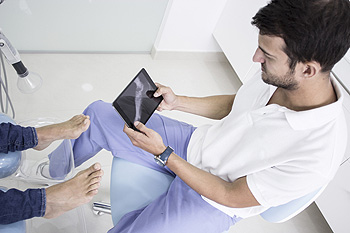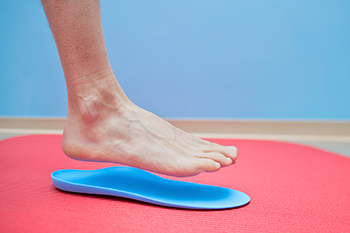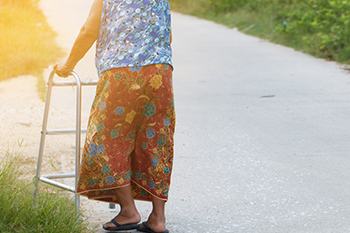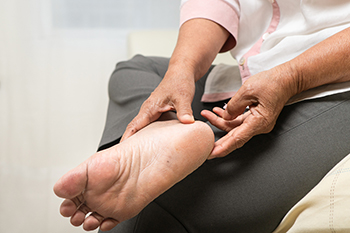Blog
Items filtered by date: December 2021
What Can Custom Orthotics Do for My Foot Condition?
Custom orthotics are prescription devices that fit in shoes and are designed to distribute weight more evenly across the feet and minimize pressure on any given area. They can also correct an abnormal gait, reduce pain, and improve foot alignment. Since they are designed to address specific conditions and the individual foot structure of the patient, fit is critical. After a podiatrist examines the patient and diagnoses their underlying condition, they may determine that orthotics can be beneficial. They will then take an impression of the patient’s foot, usually with a 3D laser scan or plaster cast. Specific materials will be chosen to address the patient’s particular condition, and the orthotic will be created. The patient will come in for a fitting and any further customizations needed to ensure the device fits the patient’s shoes and is comfortable will be made. Orthotics can be prescribed for conditions such as arthritis, plantar fasciitis, heel spurs, bunions, hammertoes, flat feet, high arches and more. If you have any of these conditions, it is suggested that you make an appointment with a podiatrist to see if orthotics may be beneficial for you.
If you are having discomfort in your feet and would like to try orthotics, contact one of our doctors from Favor Foot Ankle Leg & Wound Center. Our doctors can provide the care you need to keep you pain-free and on your feet.
What Are Orthotics?
Orthotics are inserts you can place into your shoes to help with a variety of foot problems such as flat feet or foot pain. Orthotics provide relief and comfort for minor foot and heel pain but can’t correct serious biomechanical problems in your feet.
Over-the-Counter Inserts
Orthotics come in a wide variety of over-the-counter inserts that are used to treat foot pain, heel pain, and minor problems. For example, arch supports can be inserted into your shoes to help correct overarched or flat feet, while gel insoles are often used because they provide comfort and relief from foot and heel pain by alleviating pressure.
Prescription Orthotics
If over-the-counter inserts don’t work for you or if you have a more severe foot concern, it is possible to have your podiatrist prescribe custom orthotics. These high-quality inserts are designed to treat problems such as abnormal motion, plantar fasciitis, and severe forms of heel pain. They can even be used to help patients suffering from diabetes by treating foot ulcers and painful calluses and are usually molded to your feet individually, which allows them to provide full support and comfort.
If you are experiencing minor to severe foot or heel pain, it’s recommended to speak with your podiatrist about the possibilities of using orthotics. A podiatrist can determine which type of orthotic is right for you and allow you to take the first steps towards being pain-free.
If you have any questions please contact our office located in South Amboy, NJ . We offer the newest diagnostic and treatment technologies for all your foot and ankle needs.
Ways Seniors Can Avoid Falling at Home
More than one in three people age 65 and older fall each year. Many factors that can lead to a fall at home, and some of the most common are muscle weakness, loose throw rugs on the floor, numbness in the feet, and unsafe footwear, such as backless shoes and high heels. With a few preventative measures implemented, you can reduce the chances of falling and maintain an active life as a senior. Staying physically active is especially important as one ages. Regular exercise improves muscle strength and can help keep your joints, tendons, and ligaments flexible. Stand up slowly after lying down or sitting for a prolonged period of time. Use a cane or walker as needed to aid in balance. Wear shoes or slippers with non-skid soles that fully support the feet. If you feel that you have an increased risk for falls, or are planning a new exercise regime, please consult a podiatrist for more information on prevention and various treatment options.
Preventing falls among the elderly is very important. If you are older and have fallen or fear that you are prone to falling, consult with one of our doctors from Favor Foot Ankle Leg & Wound Center. Our doctors will assess your condition and provide you with quality advice and care.
Every 11 seconds, an elderly American is being treated in an emergency room for a fall related injury. Falls are the leading cause of head and hip injuries for those 65 and older. Due to decreases in strength, balance, senses, and lack of awareness, elderly persons are very susceptible to falling. Thankfully, there are a number of things older persons can do to prevent falls.
How to Prevent Falls
Some effective methods that older persons can do to prevent falls include:
- Enrolling in strength and balance exercise program to increase balance and strength
- Periodically having your sight and hearing checked
- Discuss any medications you have with a doctor to see if it increases the risk of falling
- Clearing the house of falling hazards and installing devices like grab bars and railings
- Utilizing a walker or cane
- Wearing shoes that provide good support and cushioning
- Talking to family members about falling and increasing awareness
Falling can be a traumatic and embarrassing experience for elderly persons; this can make them less willing to leave the house, and less willing to talk to someone about their fears of falling. Doing such things, however, will increase the likelihood of tripping or losing one’s balance. Knowing the causes of falling and how to prevent them is the best way to mitigate the risk of serious injury.
If you have any questions, please feel free to contact our office located in South Amboy, NJ . We offer the newest diagnostic and treatment technologies for all your foot care needs.
Plantar Warts Can Be Treated!
How Diabetes in Seniors Can Affect the Feet
A major side effect of diabetes is poor blood circulation which often affects the legs and feet. This impeded blood flow can cause injuries to heal slowly and may also lead to infection. One of the main diabetes-related foot conditions is neuropathy, which can become a problem in mobility as well as safety. Common symptoms of diabetic-related foot issues include loss of feeling, numbness, pain, or tingling; blisters and wounds; discoloration or red streaks on the skin; swelling or pain. If you are experiencing any of these symptoms, it is wise to contact a podiatrist immediately to set up a periodic foot-care program, which may include tests for neuropathy as well as checking for wounds, corns, blisters, ingrown toenails, or warts. At home, wash and dry your feet thoroughly, apply lotion to the heels and soles of the feet, and put on clean socks every day. Exercise and move regularly to increase circulation, and keep feet elevated while sitting. A checkup with your podiatrist is suggested at least once a year.
If you need your feet checked, contact one of our doctors of Favor Foot Ankle Leg & Wound Center. Our doctors will attend to all of your foot and ankle needs and provide you with quality treatment.
Geriatrics and Podiatry
When people age, some common issues that may occur are bone density loss, dry skin, poor circulation, and rough brittle nails. These issues may also affect your foot health if the necessary steps are not taken to alleviate the problems.
It is important to take care of your feet because feet that are injured or diseased can affect your overall health. Having painful feet hinders your ability to do daily activities or may decrease your willingness to do the things that you need to do.
Visiting Your Geriatrician
As we age, health problems become more likely, so it is essential to visit your doctor for check-ups to ensure that you are doing the best you can to take care of your health. It is recommended to check your feet frequently for any possible cuts, bruises, swelling, corns or any other irregularities.
Taking Care of Elderly Feet
Cracked or dry feet can be treated by applying moisturizer often. It is also important not to wear old socks because the older the sock is, the higher the possibility there will be that there is bacteria there. Wear fresh socks and make sure they fit properly.
Proper foot health means that you can have a more active lifestyle and you will not be bogged down by pain. Foot health also leads to good circulation, which is paramount for overall health.
If you have any questions, please feel free to contact our office located in South Amboy, NJ . We offer the newest diagnostic tools and technology to treat your foot and ankle needs.
Do You Need to See a Podiatrist?
 Podiatrists are doctors who are specifically trained to diagnose and treat conditions of the feet and ankles. The feet are vulnerable to a variety of issues because they have a quarter of all the bones in the body along with a variety of muscles, ligaments, tendons, and joints. Podiatrists are important because they are trained to understand the structure and movements of all these parts. Patients who notice pain in their heel or foot, or have ingrown toenails, discolored toenails, rashes, or recently sustained a foot injury should consult with a podiatrist. Additionally, podiatrists are able to help with foot ailments that are caused by conditions such as arthritis, poor blood flow, and diabetes. Podiatrists can even evaluate the way a patient walks (biomechanics) to see how it impacts other parts of the body. Ultimately, if you have any questions or concerns about your feet, don’t hesitate to visit a podiatrist.
Podiatrists are doctors who are specifically trained to diagnose and treat conditions of the feet and ankles. The feet are vulnerable to a variety of issues because they have a quarter of all the bones in the body along with a variety of muscles, ligaments, tendons, and joints. Podiatrists are important because they are trained to understand the structure and movements of all these parts. Patients who notice pain in their heel or foot, or have ingrown toenails, discolored toenails, rashes, or recently sustained a foot injury should consult with a podiatrist. Additionally, podiatrists are able to help with foot ailments that are caused by conditions such as arthritis, poor blood flow, and diabetes. Podiatrists can even evaluate the way a patient walks (biomechanics) to see how it impacts other parts of the body. Ultimately, if you have any questions or concerns about your feet, don’t hesitate to visit a podiatrist.
If you are dealing with pain in your feet and ankles, you may want to seek help from a podiatrist. Feel free to contact one of our doctors from Favor Foot Ankle Leg & Wound Center. Our doctors can provide the care you need to keep you pain-free and on your feet.
What Is a Podiatrist?
A podiatrist is a doctor of podiatric medicine who diagnoses and treats conditions of the foot, ankle, and related structures of the leg. Your podiatrist may specialize in a certain field such as sports medicine, wound care, pediatrics, and diabetic care. Podiatrists have the ability to become board certified through training, clinical experience, and then taking an exam.
What Do Podiatrists Do?
On a daily basis, a podiatrist may perform the following activities:
- Diagnose foot ailments such as ulcers, tumors, fractures, etc.
- Use innovative methods to treat conditions
- Use corrective orthotics, casts, and strappings to correct deformities
- Correct walking patterns and balance
- Provide individual consultations to patients
It is very important that you take care of your feet. It’s easy to take having healthy feet for granted, however foot problems tend to be among the most common health conditions. Podiatrists can help diagnose and treat a variety of feet related conditions, so it is crucial that you visit one if you need assistance.
If you have any questions please feel free to contact our office located in South Amboy, NJ . We offer the newest diagnostic and treatment technologies for all your foot and ankle needs.
Blog Archives
- July 2025
- June 2025
- May 2025
- April 2025
- March 2025
- February 2025
- January 2025
- December 2024
- November 2024
- October 2024
- September 2024
- August 2024
- July 2024
- June 2024
- May 2024
- April 2024
- March 2024
- February 2024
- January 2024
- December 2023
- November 2023
- October 2023
- September 2023
- August 2023
- July 2023
- June 2023
- May 2023
- April 2023
- March 2023
- February 2023
- January 2023
- December 2022
- November 2022
- October 2022
- September 2022
- August 2022
- July 2022
- June 2022
- May 2022
- April 2022
- March 2022
- February 2022
- January 2022
- December 2021
- November 2021
- October 2021
- September 2021
- August 2021
- July 2021
- June 2021
- May 2021
- April 2021
- March 2021
- February 2021




